
25 songs inspired by movies
Music and movies go together naturally. Films have theme songs that can become popular hits, soundtracks to add drama, and scores that can build up expectations, tensions, and emotions.
The best-known movies feature music that reaches beyond the silver screen and stays with us long after the last credits have rolled. Fans treasure soundtracks like "Help!" by the Beatles, the pop hits of "The Big Chill," or the lively disco tunes of "Saturday Night Fever." Songs like "Somewhere Over the Rainbow" from "The Wizard of Oz," "As Time Goes By" from "Casablanca," and "My Heart Will Go On" from "Titanic" are everlasting.
But sometimes the influence works in reverse and movies inspire songs.
In some tunes, it's just a borrowed phrase—like Elton John singing "Goodbye Yellow Brick Road"—while other tracks are inspired by specific characters or plotlines. Many are well-known, like Merle Haggard's "The Story of Bonnie and Clyde;" others are less so, like Scott Walker's "The Seventh Seal," based on Ingmar Bergman's stark masterpiece of the same name.
Stacker compiled a list of 25 songs inspired by movies, drawing from lyrics, magazine and newspaper articles, fan sites, album liner notes, historical accounts, social media, and film archives.
So take a look, listen to the music, and enjoy the show.
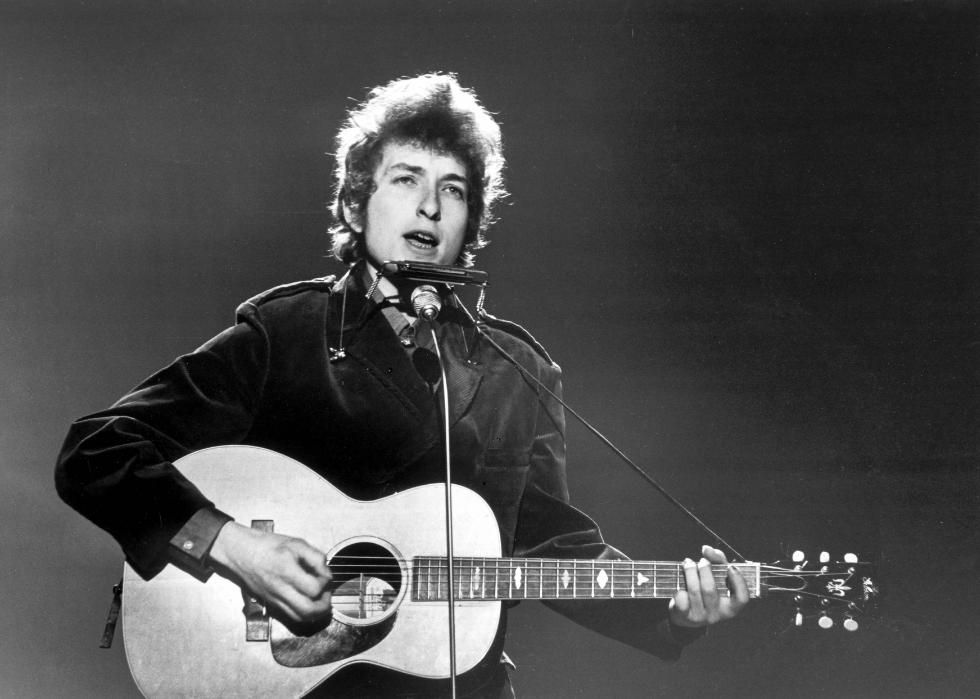
Bob Dylan: 'Motorpsycho Nightmare' (1964)
Singer-songwriter Bob Dylan dipped into the work of Federico Fellini and Alfred Hitchcock's "Psycho" for the lyrics to "Motorpsycho Nightmare" in 1964. He introduces the song's character, Rita, saying, "She looked like she stepped out of La Dolce Vita." The song goes on to say: "I was sleeping like a rat/When I heard something jerkin.' There stood Rita/Looking just like Tony Perkins/She said, 'Would you like to take a shower?/I'll show you up to the door'/I said, 'Oh, no! no!/I've been through this movie before.'"
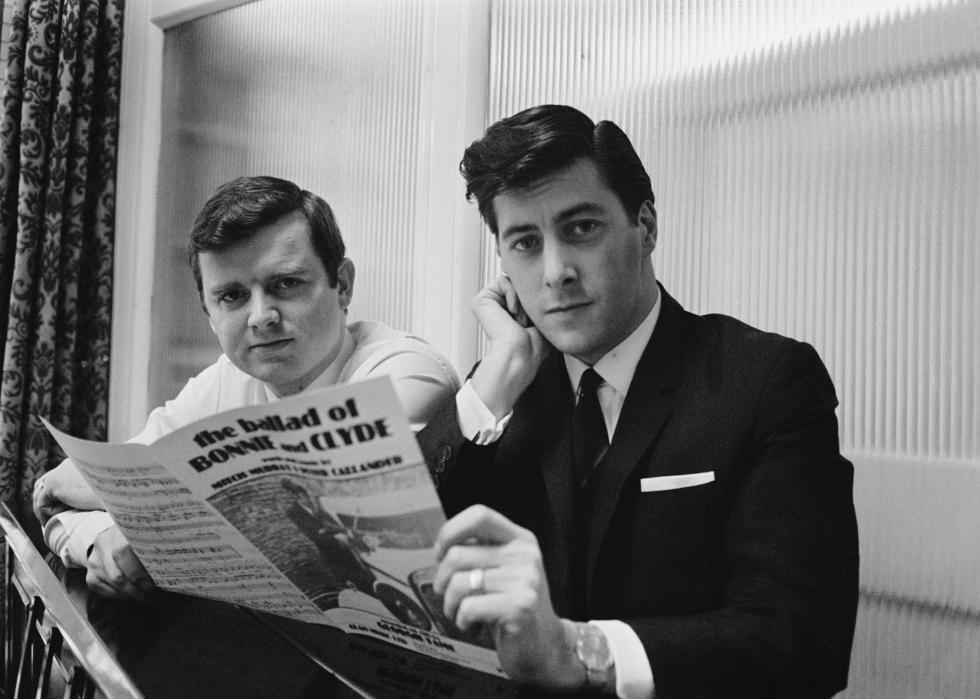
Georgie Fame: 'The Ballad of Bonnie and Clyde' (1967)
British R&B singer and pianist Georgie Fame recorded "The Ballad of Bonnie and Clyde," essentially recounting the classic movie about the Great Depression-era bank robbers Bonnie Parker and Clyde Barrow. Songwriters Mitch Murray and Peter Callander said they penned the song after watching the 1967 movie and thinking it needed better music. Lines in the song say: "Bonnie and Clyde got to be public enemy number one/Running and hiding from every American lawman's gun/They used to laugh about dying/But deep inside them they knew/That pretty soon they'd be lying/Beneath the ground together/Pushing up daisies to welcome the sun and the morning dew."
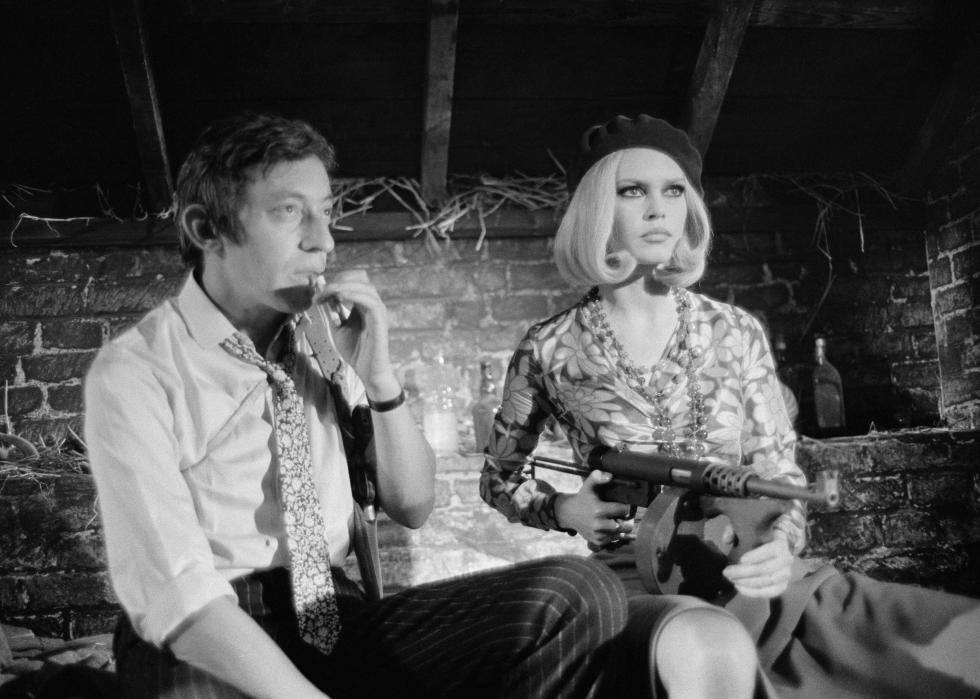
Brigitte Bardot and Serge Gainsbourg: 'Bonnie et Clyde' (1968)
French actress Brigitte Bardot recorded "Bonnie et Clyde" in 1968 with French musician Serge Gainsbourg, who wrote the song. In the noir video, the pair don period costumes and wield guns, and Bardot sports a beret à la Bonnie Parker. The song was popular as the public clamored for details of the French couple's love affair. With a catchy chorus of "Bonnie and Clyde," the lyrics read in French: "[Someday] soon, we'll fall together/I don't care about myself; it's for Bonnie that I am afraid/Whatever they do to my hide/I, Bonnie, am afraid for Clyde Barrow."
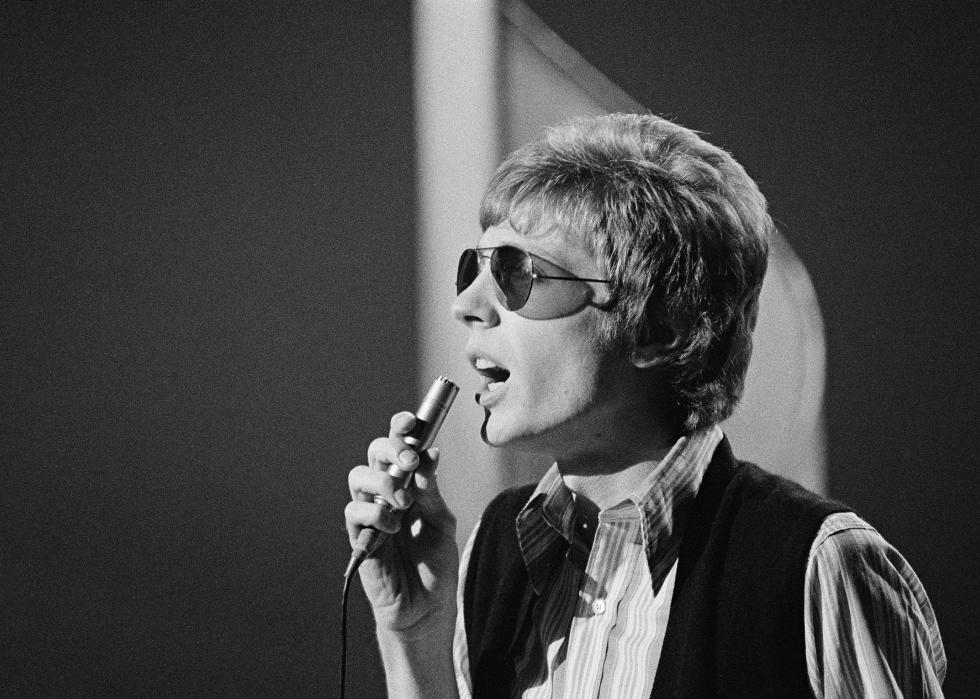
Scott Walker: 'The Seventh Seal' (1969)
Fans of Ingmar Bergman's "The Seventh Seal" will recognize the saga in the 1969 song of the same name by Scott Walker. The American singer-songwriter was the frontman for the Walker Brothers before going solo, and he found most of his success in the U.K. The 1957 classic movie told the story of a medieval knight, played by Max von Sydow, challenging the Grim Reaper to a life-or-death game of chess during the time of the Black Death. The song opens with the verse: "Anybody seen a knight pass this way?/I saw him playing chess with Death, yesterday/His crusade was a search for God and they say/It's been a long way to carry on."
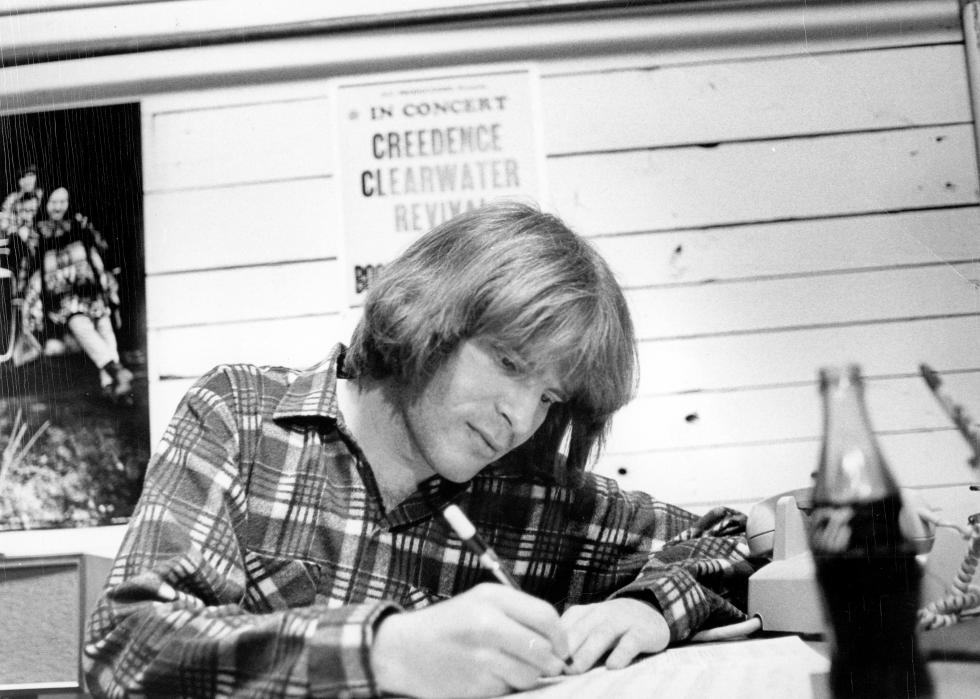
Creedence Clearwater Revival: 'Bad Moon Rising' (1969)
"Bad Moon Rising" was a hit for Creedence Clearwater Revival, written by band member John Fogerty. He said he was inspired after watching the 1941 film "The Devil and Daniel Webster (All That Money Can Buy)," especially its ominous sequence about a hurricane. "I hear hurricanes a-blowing/I know the end is coming soon," the lyrics say. "I fear rivers overflowing/I hear the voice of rage and ruin/Well don't go around tonight/Well it's bound to take your life/There's a bad moon on the rise, all right." The song's line is sometimes misconstrued as "There's a bathroom on the right," and Fogerty himself would sometimes sing it that way for fun in live performances.
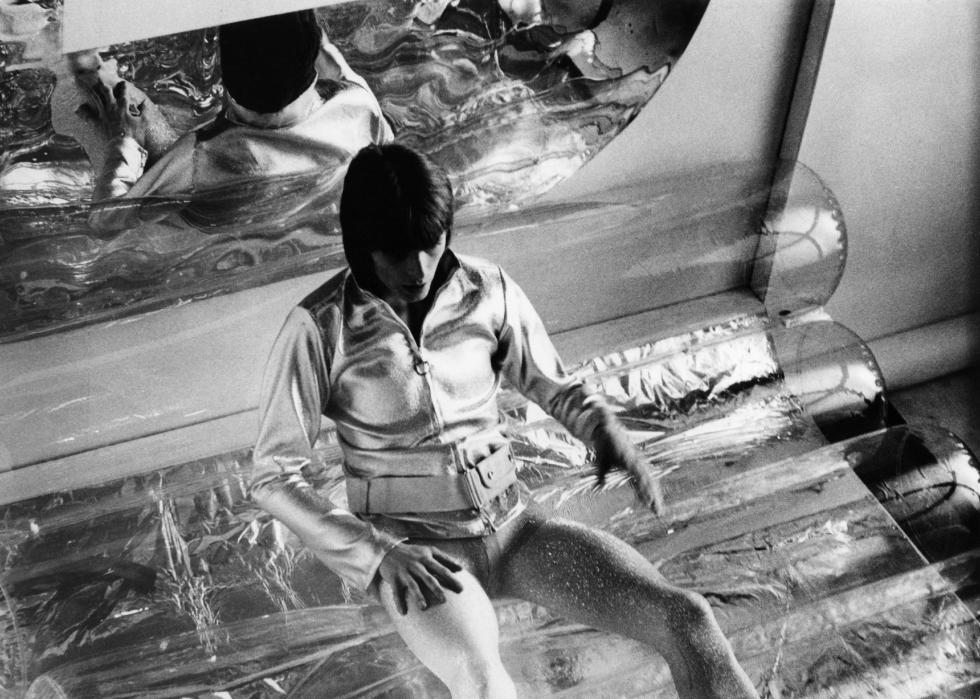
David Bowie: 'Space Oddity' (1969)
David Bowie said he wrote "Space Oddity" after watching the epic film "2001: A Space Odyssey," released in 1968. In a 2003 interview, the late rocker said: "I was very stoned when I went to see it, several times, and it was really a revelation to me. It got the song flowing." The song was released just days before astronauts Neil Armstrong and Buzz Aldrin became the first men to walk on the moon in July 1969.
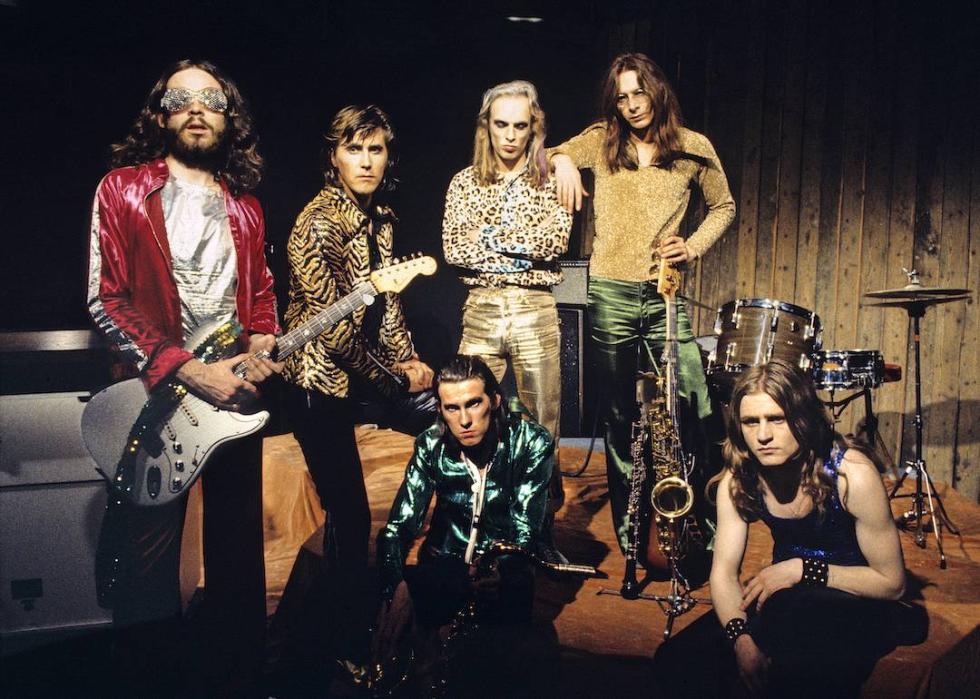
Roxy Music: '2HB' (1972)
Bryan Ferry's Roxy Music honored the 1942 classic drama "Casablanca," starring Humphrey Bogart, with the song "2HB." "Here's looking at you kid," Ferry sings, adding, "You gave her away to the hero." The song even includes a saxophone solo based on the film's "As Time Goes By" tune.
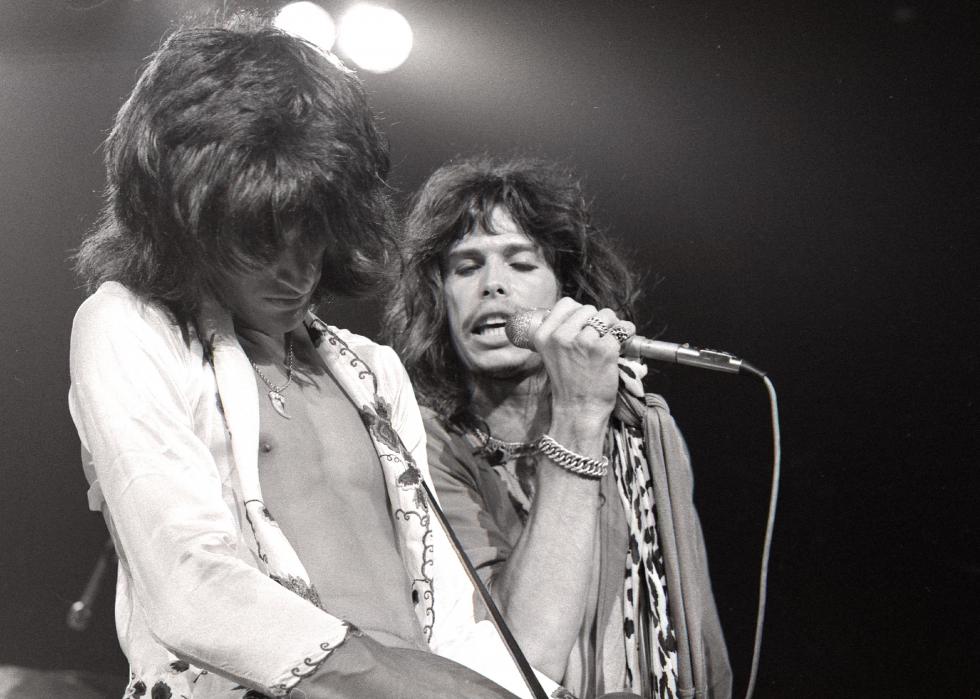
Aerosmith: 'Walk This Way' (1975)
Aerosmith's hit song "Walk This Way" was inspired by "Young Frankenstein" after band members Steven Tyler and Joe Perry watched it in 1974. The title of the song stems from a gag in the movie, when Marty Feldman—portraying the hunchbacked Igor—tells Gene Wilder—playing Dr. Frankenstein—to follow him. The song's lyrics have nothing to do with the plot, but the chorus repeats the chant "Walk this way!"
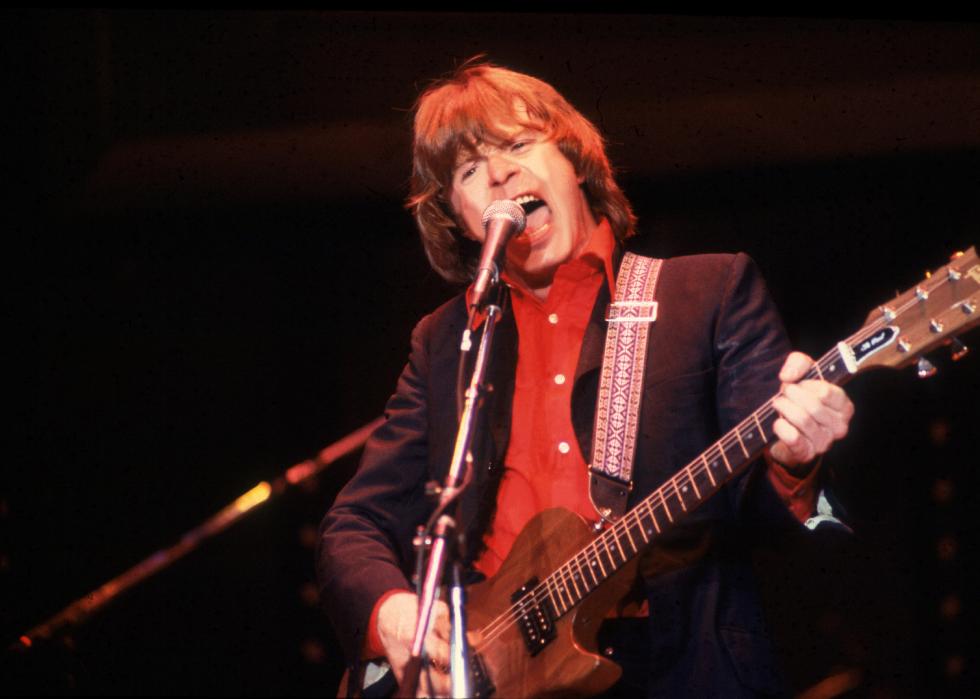
Dave Edmunds: 'The Creature from the Black Lagoon' (1979)
Welsh guitarist Dave Edmunds tells the story of "The Creature from the Black Lagoon" in his 1979 song by the same name. Edmunds was a solo artist but also performed with British blues bands, and he was a member of the band Rockpile in the late 1970s. His song starts with the verse: "All he wanted was a lady/When at night he came up from the deep/He was feeling like any other lonely fella/Decided to take one while the city was asleep."
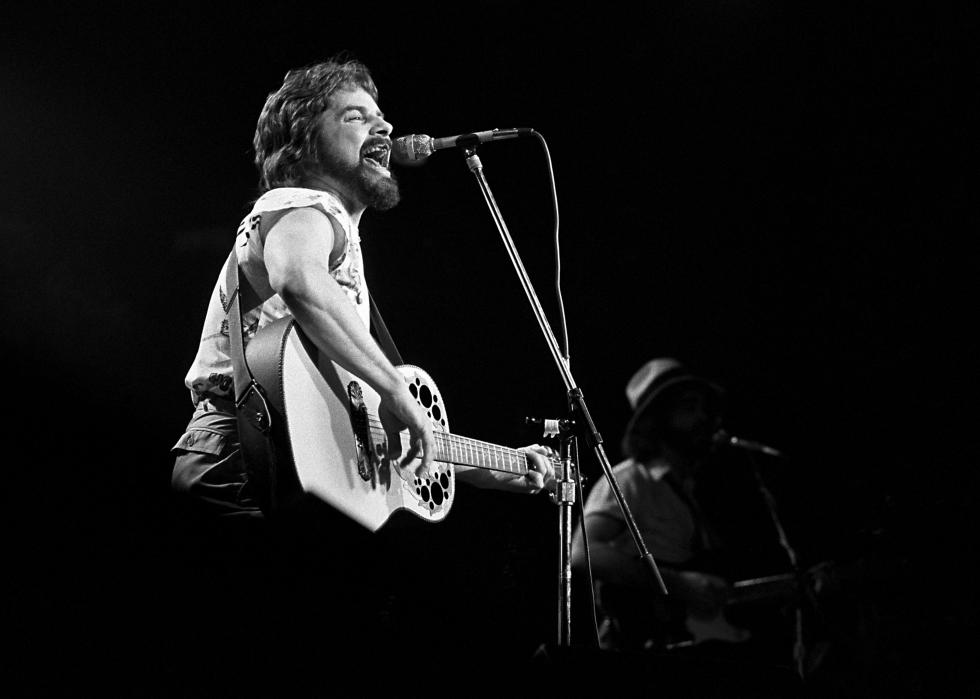
Bertie Higgins: 'Key Largo' (1981)
Singer Bertie Higgins released "Key Largo" on his album "Just Another Day in Paradise." In it, he compares a love affair to that of Humphrey Bogart and Lauren Bacall in the 1948 film of the same name. "We had it all/Just like Bogie and Bacall/Starring in our old late, late show/Sailing away to Key Largo," Higgins sings. "Here's lookin' at you, kid."

The Clash: 'Red Angel Dragnet' (1982)
On the 1982 album "Combat Rock"—one of the last by The Clash—the song "Red Angel Dragnet" serves a paean to the 1976 movie "Taxi Driver," starring Robert De Niro as vigilante Travis Bickle. "Come in, Travis," the song goes. "Come in, Travis/'All the animals come out at night/Queens, fairies, dopers, junkies, sick, venal (who got shot tonight?) ... Listen you screw heads, here is a man who would not take it anymore/A man who stood up against the scum, the filth.'"
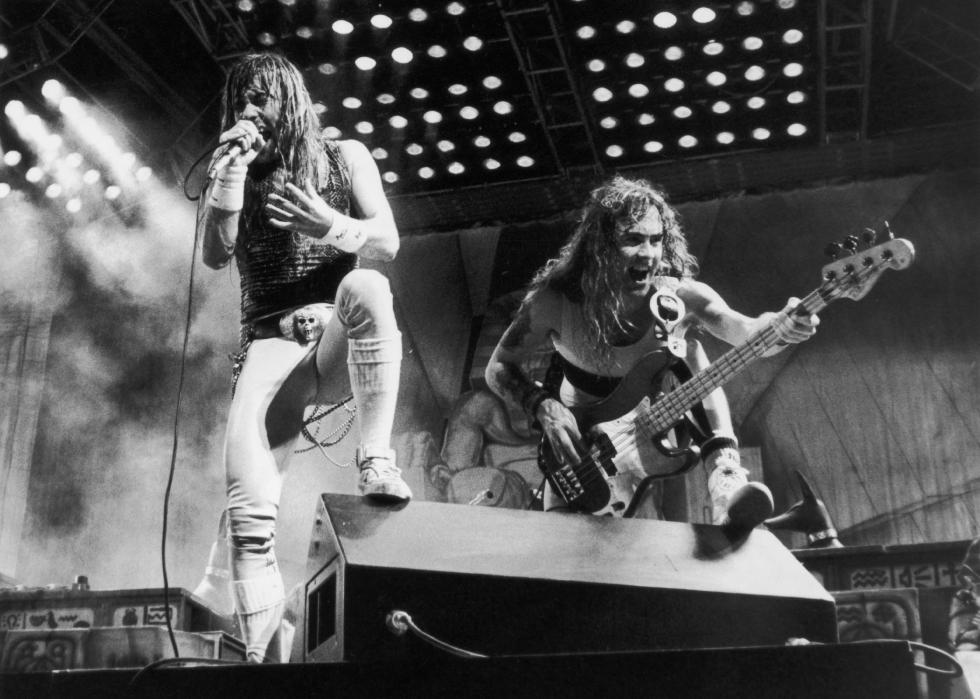
Iron Maiden: 'Where Eagles Dare' (1983)
Iron Maiden paid homage to the 1968 movie "Where Eagles Dare" with its song of the same name. The lyrics recount the story of the film, set in World War II and starring Richard Burton and Clint Eastwood. The film follows an Allied attempt to rescue an American general captured by the Nazis. The lyrics go: "They dared to go/Where no one would try/They chose to fly/Where eagles dare."
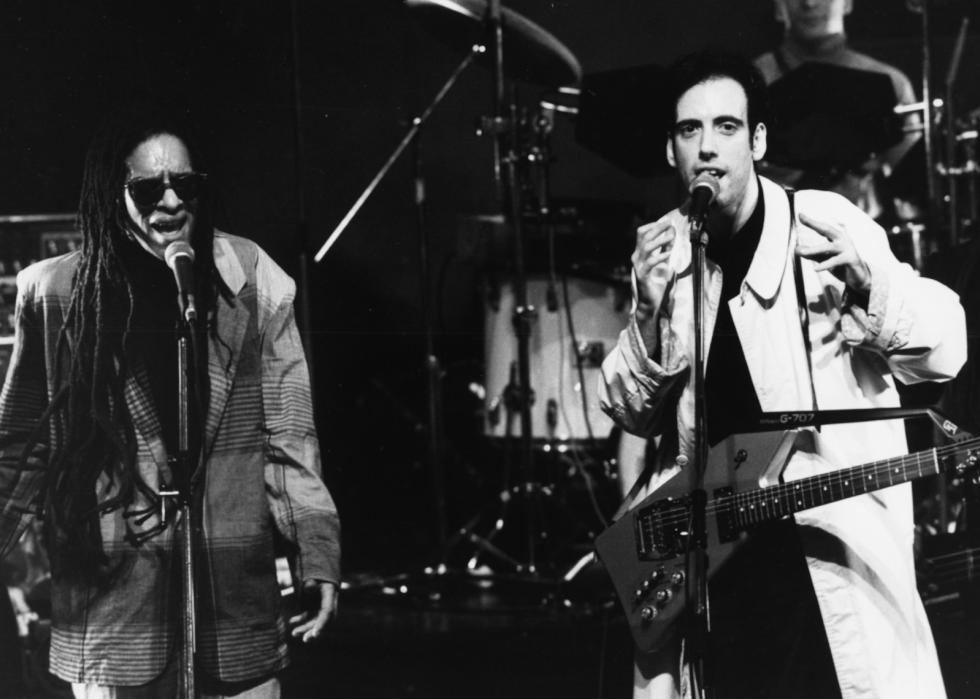
Big Audio Dynamite: 'E=MC2' (1985)
After leaving The Clash, British guitarist Mick Jones formed the group Big Audio Dynamite. Its 1985 single, "E=MC2," is filled with references to films by English director Nicolas Roeg. The "space guy fell from the sky" line is a reference to the David Bowie starrer "The Man Who Fell to Earth," and the "don't like no Aborigine" line refers to the 1971 film "Walkabout," which was set in the Australian outback. The lines "Pop star dyed his hair/No fans to scream and shout when mobsters came to flush him out," is also a lyric pegged to the film "Performance," which starred Mick Jagger.
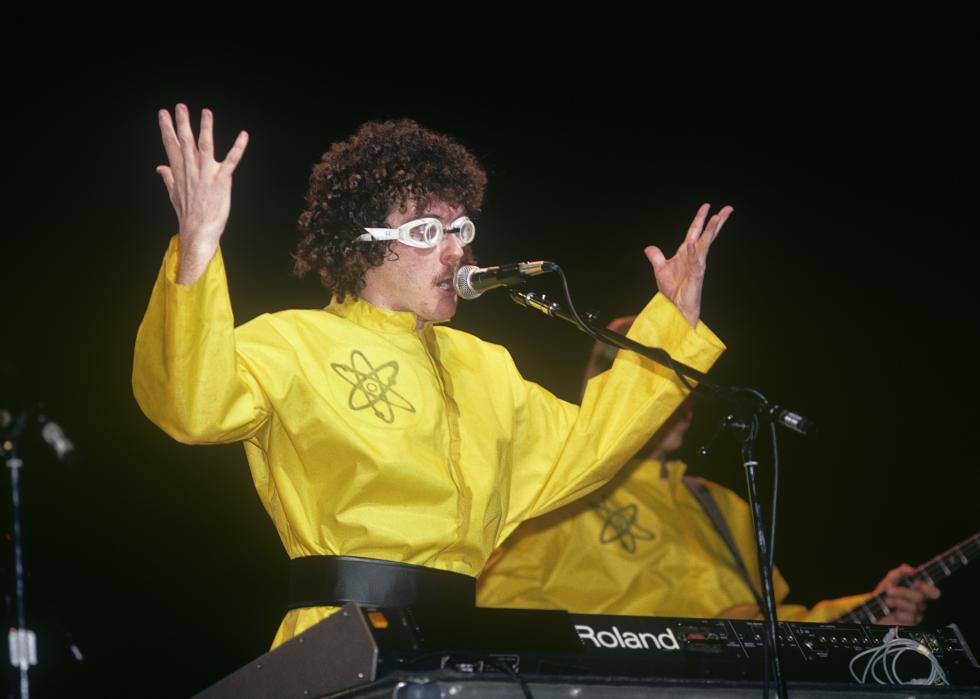
'Weird Al' Yankovic: 'Yoda' (1985)
Drawing on the Kinks' hit song "Lola," the parody "Yoda" by "Weird Al" Yankovic revisited the 1980 movie "The Empire Strikes Back." The song's lyrics go: "Well I left home just a week before/And I've never, ever been a Jedi before/But Obi-Wan, he set me straight, of course/He said, 'Go to Yoda and he'll show you the Force.'"
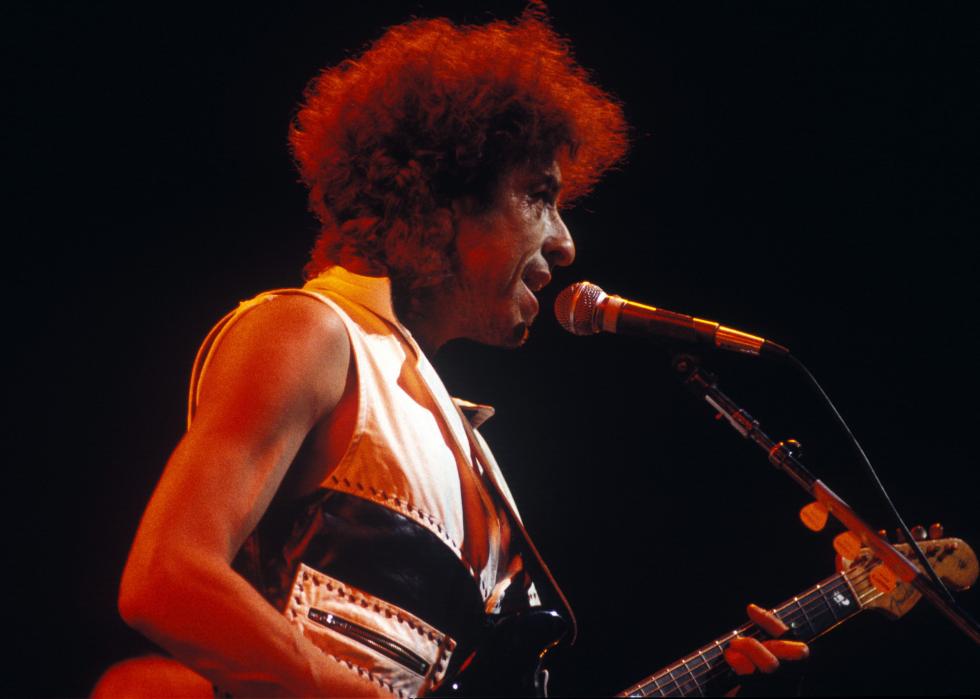
Bob Dylan: 'Brownsville Girl' (1986)
Bob Dylan took fans to the movies with his 1986 song "Brownsville Girl," an 11-minute song pegged to the 1950 western, "The Gunfighter." It opens with the lyrics: "Well, there was this movie I seen one time/About a man riding 'cross the desert, and it starred Gregory Peck/He was shot down by a hungry kid trying to make a name for himself/The townspeople wanted to crush that kid down and string him up by the neck/Well, the marshal, now he beat that kid to a bloody pulp/As the dying gunfighter lay in the sun and gasped for his last breath/'Turn him loose, let him go, let him say he outdrew me fair and square.'"
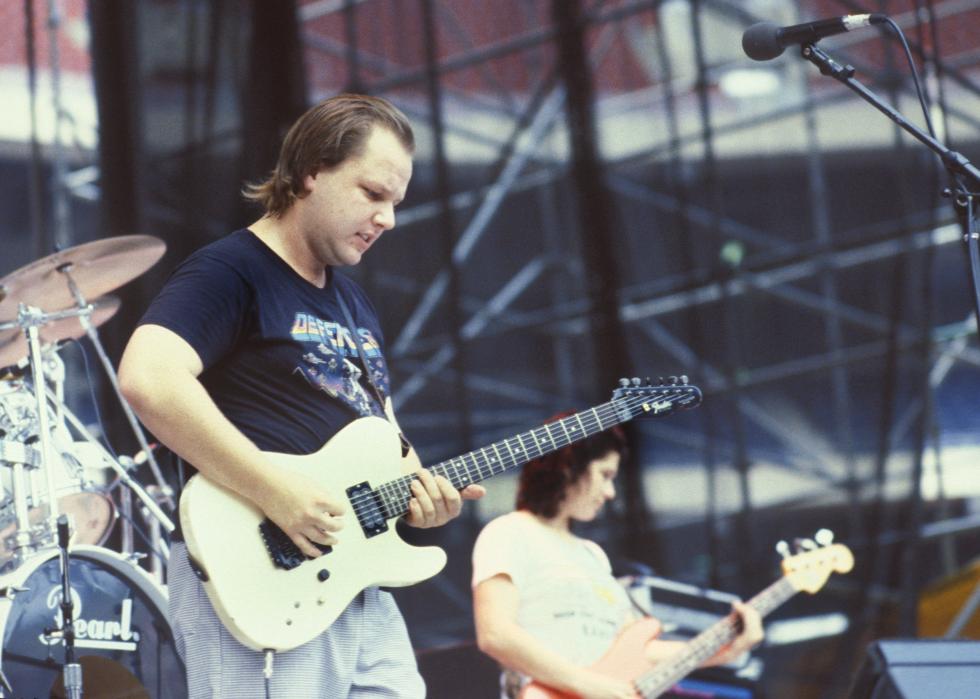
Pixies: 'Debaser' (1989)
"Debaser," the opening song from the Pixies album "Doolittle," owes its origins to "Un Chien Andalou," a surreal classic from 1929 created by director Luis Buñuel and artist Salvador Dalí. In a vivid reference to one of the film's most graphic scenes, the song goes: "Got me a movie, I want you to know/Slicing up eyeballs, I want you to know … I am un chien andalusia."
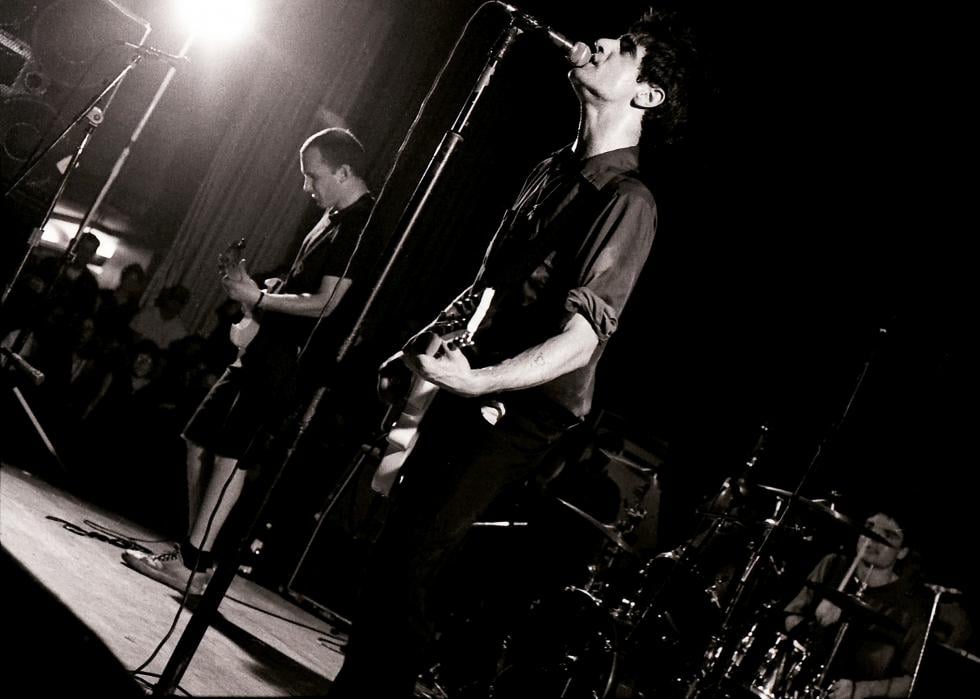
Fugazi: 'Walken's Syndrome' (1993)
Hardcore band Fugazi drew lyrical inspiration for their "Walken's Syndrome" from actor Christopher Walken's character in Woody Allen's 1977 "Annie Hall." In the movie, Walken, playing the brother of Diane Keaton's character Annie Hall, ponders driving a car into oncoming traffic. The lyrics go: "Lay down your arms and then/Steer into the headlights like the dead light of the last sun you'll see … Steering into headlights and you're gone."

'Weird Al' Yankovic: 'Jurassic Park' (1993)
"Weird Al" Yankovic made a number of humorous song parodies based on movies, including "Jurassic Park." Drawing from the 1968 song "MacArthur Park" by Richard Harris, Yankovic sings: "Jurassic Park is frightening in the dark/All the dinosaurs are running wild/Someone shut the fence off in the rain/I admit it's kinda eerie/But this proves my 'Chaos Theory'/And I don't think I'll be coming back again/Oh noooo!"
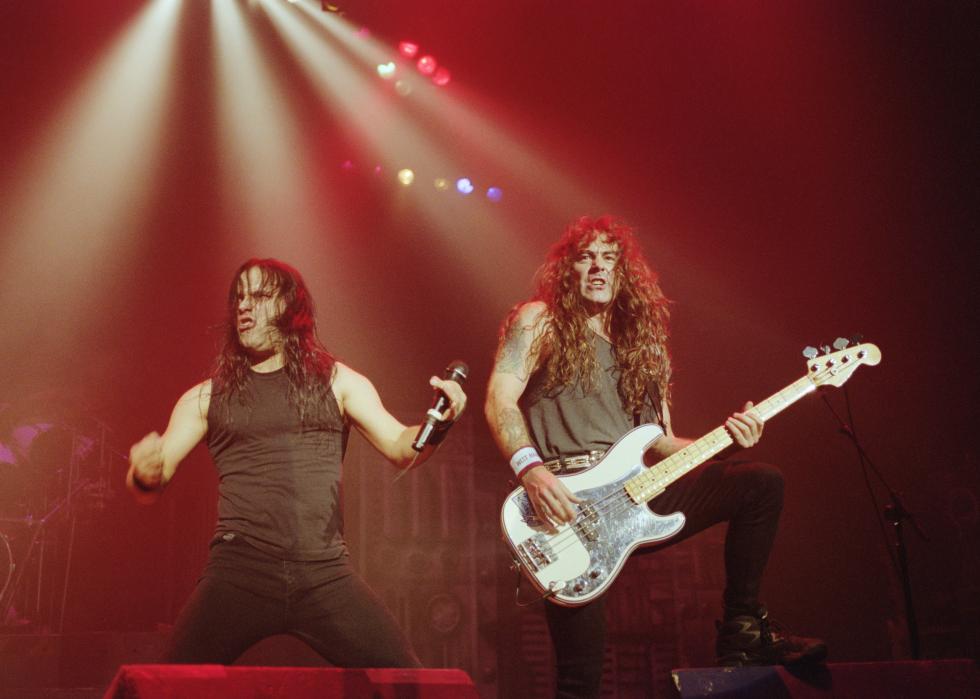
Iron Maiden: 'Man on the Edge' (1995)
Iron Maiden looked to the movie "Falling Down" for its song "Man on the Edge." Michael Douglas stars in the 1993 film as a divorced, unemployed, and frustrated man who abandons his car on a Los Angeles highway and sets off on what becomes a violent path. "The freeway is jammed/And it's backed up for miles/The car is an oven and baking is wild/Nothing is ever the way it should be/What we deserve we just don't get you see," the song goes. "A briefcase, a lunch, and a man on the edge/Each step gets closer to losing his head."
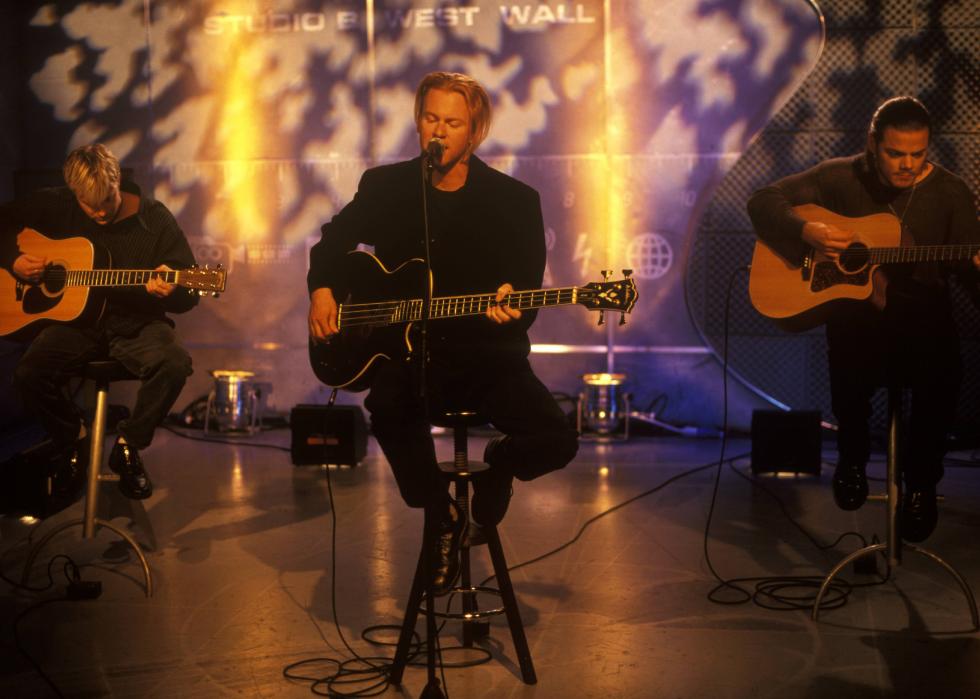
Deep Blue Something: 'Breakfast at Tiffany's' (1995)
Named for the Audrey Hepburn film "Breakfast at Tiffany's," the song by Deep Blue Something is actually based on another of her iconic films: "Roman Holiday." "You'll say we've got nothing in common/No common ground to start from,'" the song opens. The romantic comedy with Gregory Peck was Hepburn's first movie role. She plays a bored English princess sneaking away from her royal duties, with Peck as a reporter she meets on the streets of Rome.

'Weird Al' Yankovic: 'The Saga Continues' (1999)
"Weird Al" Yankovic extended his string of parody songs based on films with "The Saga Continues," drawn from the 1999 movie "Star Wars: Episode I – The Phantom Menace." Using the structure and tune of Don McLean's rock eulogy "American Pie," Yankovic sings: "My, my, this here Anakin guy/May be Vader someday later, now he's just a small fry/And he left his home and kissed his mommy goodbye/Sayin', 'Soon I'm gonna be a Jedi'/'Soon I'm gonna be a Jedi.'"

The White Stripes: 'The Union Forever' (2001)
In 2001, the White Stripes released "The Union Forever," a song based on lines in Orson Welles' 1941 masterpiece, "Citizen Kane." The lyrics reference "C.F.K.," Welles' character Charles Foster Kane. Parts of the song, written by Jack White, include lines like, "Well I'm sorry but I'm not/Interested in gold mines/Oil wells, shipping or real estate/What would I liked to have been?/Everything you hate," as well as the verse, "Who likes to smoke?/Enjoys a joke?/And wouldn't get a bit/Upset if he were really broke?/With wealth and fame/He's still the same/I'll bet you five you're not alive/If you don't know his name."
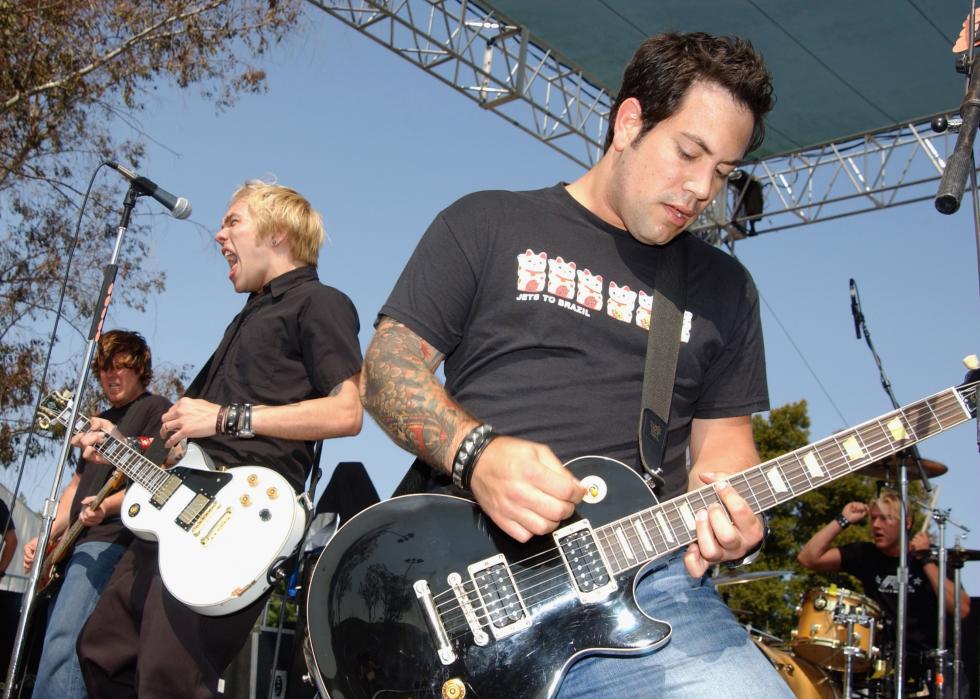
The Ataris: 'So Long, Astoria' (2003)
The Ataris released the song "So Long, Astoria" from its album of the same name as a homage to "The Goonies." The 1985 movie chronicles the adventures of a group of children from Astoria, Oregon. "So Long, Astoria," begins the song's closing verse. "I found a map to buried treasure/And even if we come home empty-handed/We'll still have our stories of battle scars/Pirate ships and wounded hearts/Broken bones and all the best of friendships."
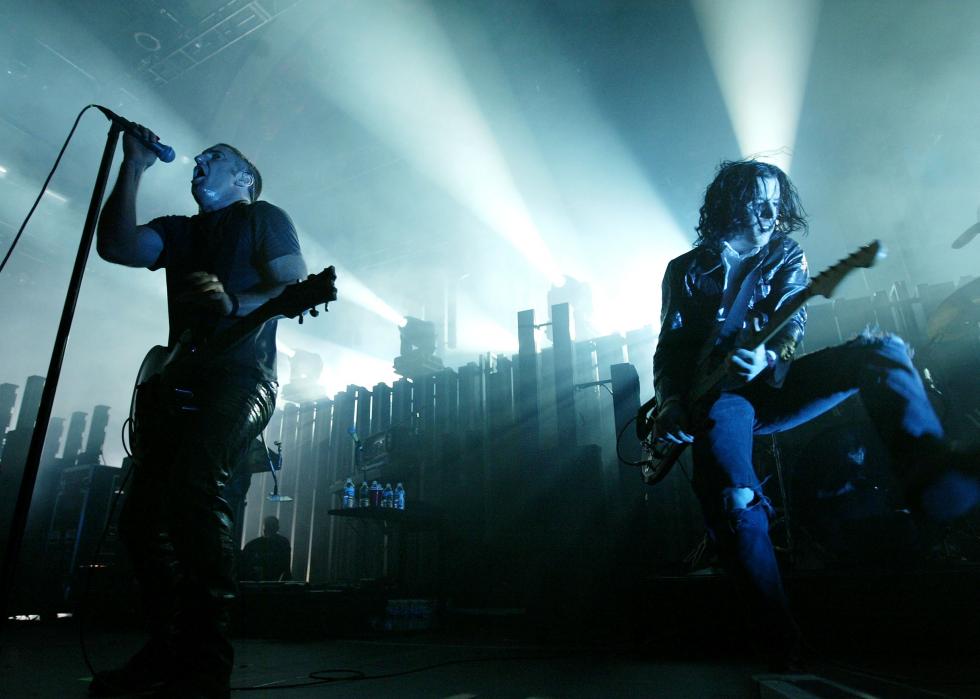
Nine Inch Nails: 'Only' (2005)
Nine Inch Nails' song "Only," from their fourth album, was inspired by the movie "Fight Club." The 1999 film starred Edward Norton and Brad Pitt. The song was incredibly popular, having held the #1 spot on the Billboard Modern Rock chart for seven weeks at the time of its release. Referring to the storyline of the film, the song goes: "Because you were never really real/To begin with/I just made you up/To hurt myself."

alt-J: 'Matilda' (2012)
Indie rocker alt-J's debut album, "An Awesome Wave," included the song "Matilda." The song was inspired by the "Léon: The Professional" character Mathilda, played by Natalie Portman. Twelve-year-old Mathilda is taken in and then trained by a professional assassin after the murder of her family. "Put the grenade pin in your hand, so you understand who's boss," the band sings. The group also wrote the song "Leon," which includes the line: "She's armed to her teeth, be careful, Leon."



